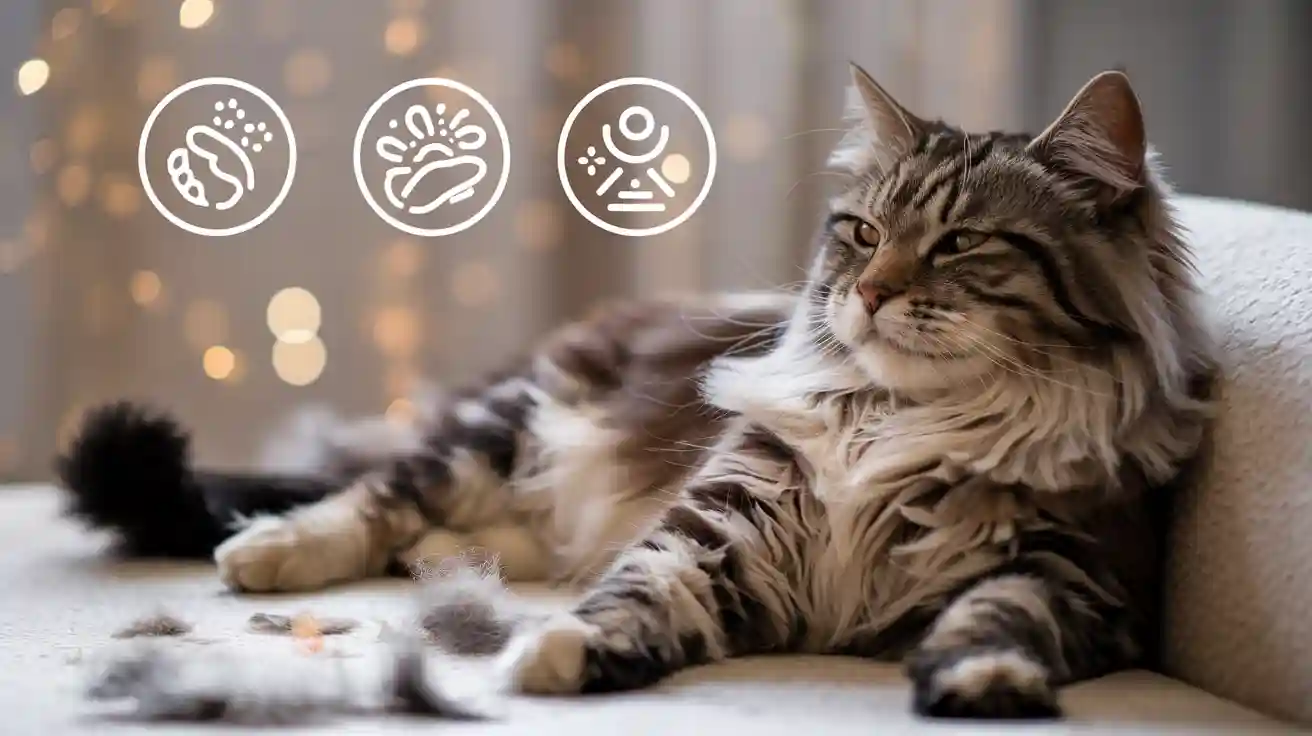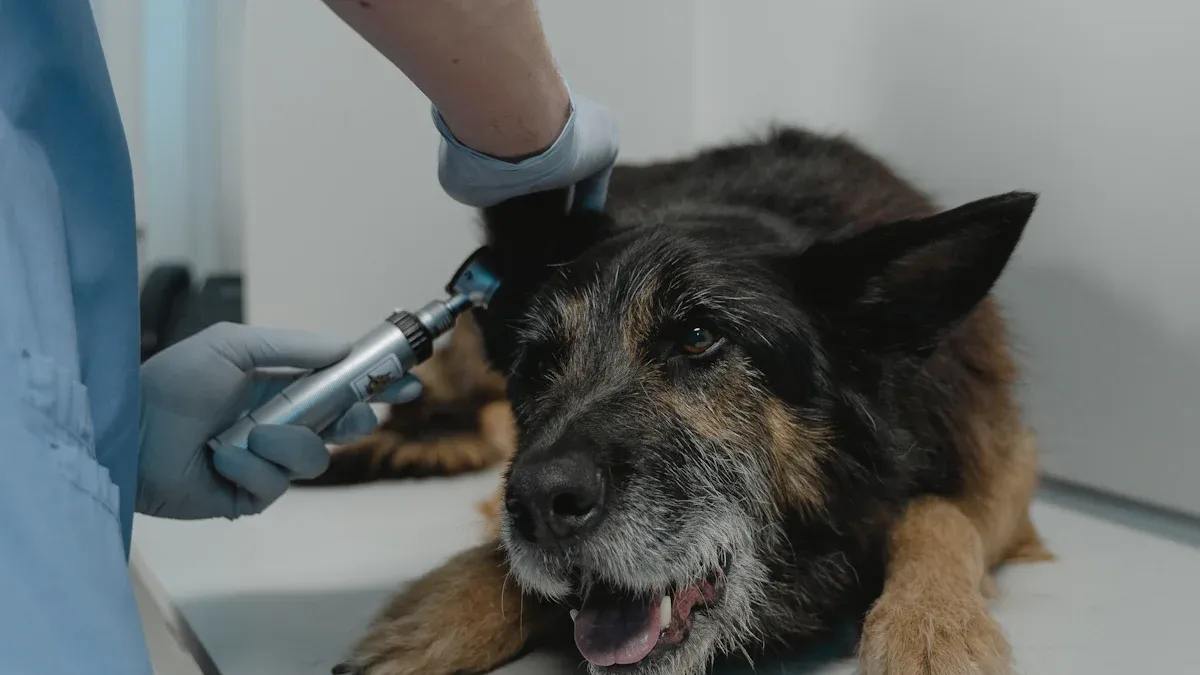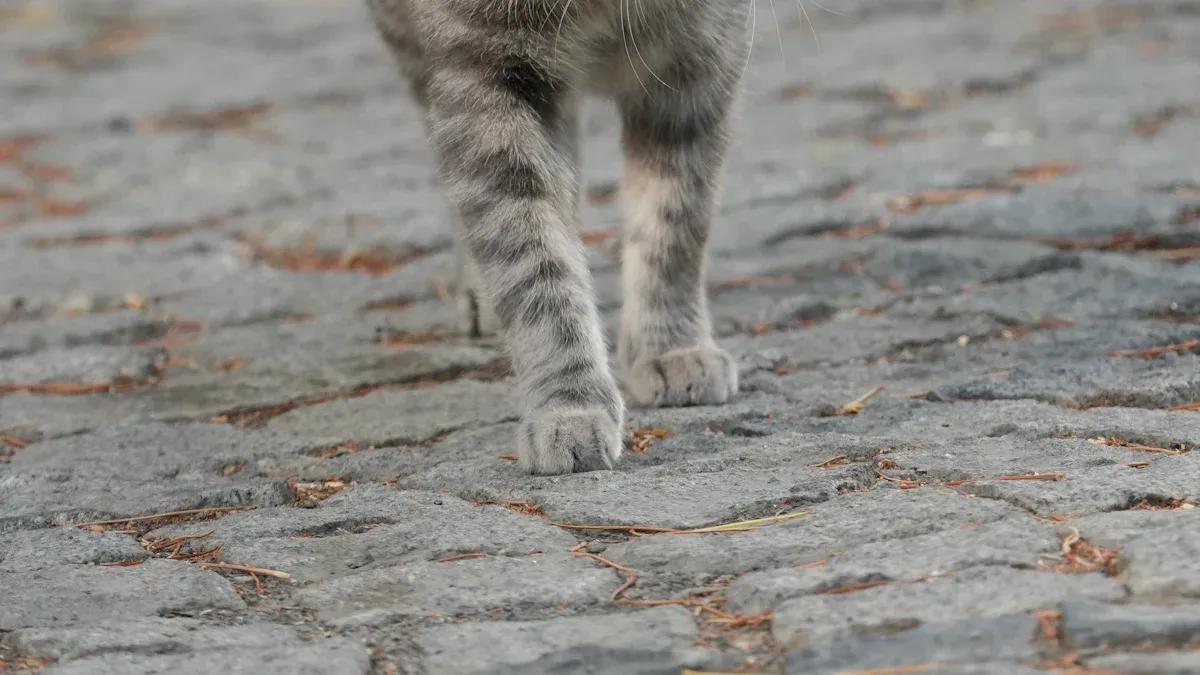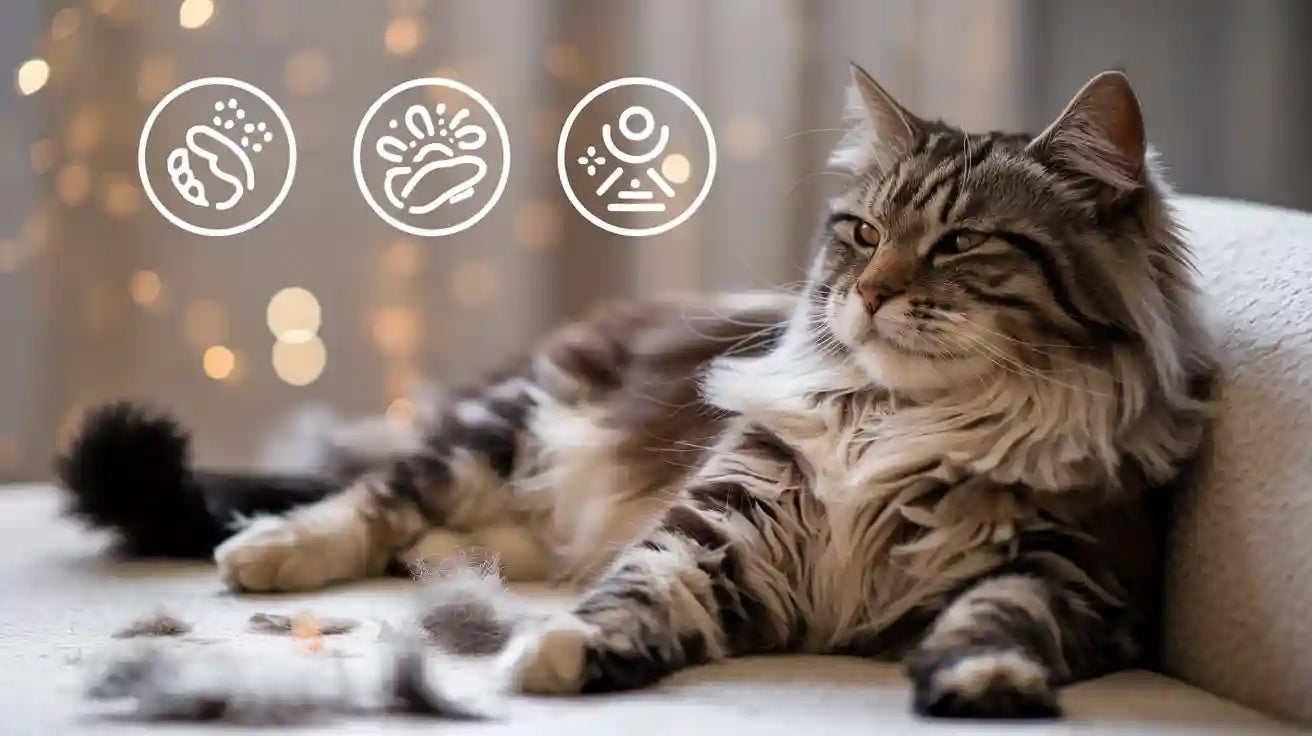
Yes, you might notice that cats shed more as they get older. This happens for a few reasons.
Older cats often groom themselves less, so you may spot more fur clumps around your home.
Their fur can change texture with age, making it easier to shed.
Health issues like arthritis or confusion can make grooming tough.
Don’t worry—this is common and something you can manage. Stick around for tips that make life easier for you and your furry friend.
Why Cats Shed More with Age
Skin and Fur Changes
As your cat gets older, you might notice changes in their skin and fur. These changes are a big reason why cats shed more as they age. The skin can become thinner and less elastic. You may see patches where the fur looks thin or even spots where hair is missing. Sometimes, your cat’s skin feels dry or flaky. This happens because older cats produce less oil, which usually keeps the skin soft and the coat shiny.
The outer layers of the skin and hair follicles get weaker.
Your cat might start to grow white or gray hairs, especially on the face.
The skin can look scaly or oily, depending on how much oil the body makes.
Older cats often have brittle claws and less flexible skin.
You may also notice that your cat’s fur does not look as bright or smooth as before. The coat can lose its shine, making shedding more obvious. When the skin loses its stretchiness, more hair falls out. This is why you find more fur around your home.
Tip: If you see sudden bald spots or sores, talk to your vet. Sometimes, skin problems in older cats can mean there is another health issue.
Coat Texture
The texture of your cat’s coat changes with age. You might feel that the fur is rougher or not as soft. Some cats develop coarse hair, while others get patches of thin fur. The color of the coat can also change. You may spot darker areas or more white hairs.
The coat may become dull and less shiny.
Fur can feel thicker in some places and thinner in others.
Cats shed more when their fur loses its smooth texture.
When the natural oils in the skin decrease, the coat looks less healthy. This makes it easier for loose hair to fall out. You might notice more shedding during brushing or when your cat moves around. These changes are normal, but regular grooming helps keep your cat comfortable and reduces shedding.
Health Issues in Older Cats

As your cat gets older, you might notice changes in their health that affect shedding. Many senior cats deal with problems that make their fur fall out more often. You may see extra hair on your furniture or clothes. Let’s look at some of the most common reasons why cats shed more when they age.
Hormonal Changes
Hormonal imbalances can cause big changes in your cat’s body. Hyperthyroidism is one of the most common issues in older cats. This condition makes your cat’s thyroid gland work too hard. When this happens, you may see more shedding and thinner fur. Sometimes, your cat’s coat looks dull or patchy. Hormonal changes can also make your cat feel stressed, which leads to even more shedding.
If you notice your cat acting restless or losing weight, talk to your vet. These signs often go along with increased shedding.
Chronic Illness
Older cats often develop chronic illnesses. Allergies, parasites, and skin conditions can make shedding worse. Your cat might scratch more or lick their fur until bald spots appear. Stress and poor diet also play a role. When your cat feels sick or anxious, shedding increases. You may see clumps of fur or even scaly skin. Common health problems in senior cats include allergies, parasites, and skin infections.
Allergies can make your cat’s skin itchy.
Parasites like fleas or mites cause hair loss.
Skin infections lead to extra shedding.
Medication Effects
Many senior cats take medicine for long-term health problems. Some medications, especially corticosteroids, can cause hair loss. You might notice your cat’s fur thinning after starting a new medicine. Other drugs can make shedding worse by changing how your cat’s body works. If you see sudden changes in your cat’s coat, ask your vet about possible side effects.
Medicines for arthritis or thyroid problems may increase shedding.
Long-term use of certain drugs can make your cat’s fur fall out faster.
Shedding is a normal part of aging, but health issues and medications can make it more noticeable. Keep an eye on your cat’s coat and talk to your vet if you see big changes.
Grooming and Mobility in Cats

Reduced Grooming
As your cat gets older, you might notice they spend less time grooming. This change can lead to more loose fur and even mats in their coat. Many older cats struggle with grooming because of pain or discomfort. Take a look at some common reasons in the table below:
Factor |
Description |
|---|---|
Arthritis |
Affects over 90% of cats over 12 years, making grooming difficult. |
Dental disease |
Can lead to neglect in grooming due to discomfort. |
Changes in coat texture |
Alters the shedding cycle and grooming needs. |
Other diseases |
Conditions like hyperthyroidism and diabetes can also reduce grooming behavior. |
You may see your cat’s coat looking less tidy. Pain from arthritis or dental issues can make grooming hard. When your cat grooms less, shedding increases. You might find more fur on your furniture and clothes.
Older cats often face grooming difficulties due to age-related conditions.
Pain from conditions like spinal arthritis can hinder their ability to groom themselves effectively.
A decrease in grooming and self-care is a common behavior change in aging cats.
Mobility Problems
Mobility problems are very common in senior cats. Arthritis and joint disease can make it tough for your cat to move around. You might see them struggle to jump or climb. These issues also make it hard for your cat to reach certain spots on their body to groom. When cats can’t groom well, shedding gets worse.
Arthritis and degenerative joint disease are common in older cats, affecting their mobility.
These conditions can hinder a cat's ability to jump or climb, making it challenging to reach food, water, and litter boxes.
Older cats may struggle with grooming due to mobility issues, leading to increased shedding.
Cats may avoid grooming painful or hard-to-reach areas, which leads to a matted and unkempt coat. You might notice your cat’s fur looking rough or tangled.
Matted Fur
When your cat grooms less and has trouble moving, mats can form in their fur. Matted fur traps loose hair and dirt, making shedding even more noticeable. Mats can also cause discomfort and skin problems for your cat.
Older cats may develop matted fur due to difficulty in grooming.
Regular grooming is essential to remove dead hair and maintain a healthy coat.
Changes in grooming habits can lead to a ragged appearance and increased shedding.
You can help your cat by brushing them often. Regular brushing removes loose fur and prevents mats from forming. Daily brushing works best for long-haired cats. Always use gentle strokes, especially if your cat has arthritis or sensitive skin.
Tip: Check your cat’s coat and skin often for lumps, mats, or sore spots. If you find anything unusual, talk to your vet.
You’ve learned that cats shed more as they reach old age because of changes in their skin, health issues, and grooming struggles. Shedding is normal for senior cats, but you should keep an eye on their coat. Try these tips to help your cat feel comfortable:
Brush your cat often to remove loose fur.
Feed a balanced diet with plenty of water.
Schedule regular vet checkups.
Watch for bald spots or skin problems.
If your cat’s shedding seems sudden or severe, talk to your vet right away.
FAQ
Why does my senior cat shed more in the spring and fall?
You might notice more shedding during these seasons. Cats often lose their old coat to grow a new one. Older cats may shed even more because their skin and fur change with age.
How often should I brush my older cat?
Try brushing your cat every day if possible. Regular brushing helps remove loose fur and keeps the coat healthy. It also gives you a chance to check for mats or skin problems.
Can diet help reduce shedding in older cats?
Yes! A balanced diet with enough protein and healthy fats can support your cat’s skin and coat. You can ask your vet about special foods or supplements for senior cats.
Should I worry if my cat suddenly sheds a lot more?
If you see sudden or severe shedding, call your vet. Sudden changes can mean health problems. It’s always better to check and keep your cat safe.
What kind of brush works best for senior cats?
Soft-bristle brushes or grooming gloves work well for older cats. These tools feel gentle on sensitive skin and help remove loose fur without causing pain.










